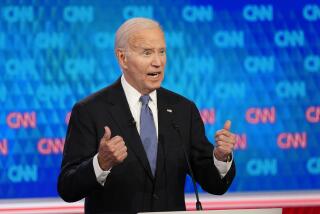Campaign â96 / THE PRIMARIES : Why Does Nader Candidacy Worry White House? : Clinton aides are keeping an eye on the consumer activist. The Green Party nominee may be the spoiler in a close race.
WASHINGTON â He doesnât sound or act like a candidate, but Ralph Nader, the longtime consumer advocate and thorn-in-the-side to corporate America, is running for president, sort of.
As Californians will discover when they look at next Tuesdayâs primary ballot, Nader has agreed to be the tiny Green Partyâs presidential candidate here. He also plans to be on Maineâs general election ballot in November and may run in other states.
The iconoclastic consumer advocate has made no commitment to wage any sort of national campaign, vows to spend no more than $5,000 in any one state and generally holds the political process in disdain.
So why are political tongues wagging over his candidacy? Because if he runs in the general election, he presumably will siphon votes from President Clinton, perhaps in the same manner Ross Perot gobbled up votes that likely would have gone to George Bush in 1992. The prospect is enough to concern White House advisors, who worry that in a close election, Nader could play the spoiler.
A new Times Poll indicates that in a hypothetical matchup with Clinton, Sen. Bob Dole and Perot, whose Reform Party will also be on the November general election ballot, Nader would draw roughly 7% of the vote, pulling votes from both Clinton and Perot. And while Clinton currently has a large lead in the state, strategists believe the race will tighten significantly by November, perhaps enough so that 7% of the vote could make a difference.
That is not something that worries the tart-tongued activist, who complains that Clinton has moved so far to the right that he refers to him as âGeorge Ronald Clinton.â
âIf you look at what Clinton is doing now, he wouldnât qualify as a liberal Republican in the 1970s,â Nader grumbles.
The prospect of a Republican victory âis not my concern,â says Nader, who sees his lifetime work increasingly under attack as the national policy debate grows more conservative. âThat [thinking] would put me in a tactical mode instead of a democracy-building mode. Thatâs not what I want to do. . . . Both parties have spoiled and destroyed democratic politics in our country.â
Known for more than three decades as the sober champion for consumers and cheerless foe of corporations, Nader entered the presidential race inconspicuously last November, releasing a statement saying he would permit the California Green Party to place his name on its primary ballot.
Never mind that he doesnât belong to the Green Party. He says he agrees with many of its principles, such as social justice and devolvement of power to the people.
In a recent interview, Nader spewed forth his frustration with an American culture symbolized by home shopping networks, unfunded pension funds and the news mediaâs trivialization of politics. He also said he believes the range of political ideas has grown so narrow that voters are left to choose between âTweedle-dum and Tweedle-dee,â as he calls the Republicans and Democrats.
As proof the parties have morphed into a muddied blob, Nader cites Clintonâs signature on the Republican bill rescinding the 55-mph speed limit, his support for a bill revamping the telecommunications industry and his blending of ideas on welfare reform.
Federal budget talks between the White House and Republicans also âmade clear how far to the right the political forces now go,â he says.
As the leaders of the major parties limit their arguments to âbudget, flat tax and Bosnia,â Nader wants to debate them on issues he says are equally critical: consumer protection, campaign finance reform, health insurance, strengthening workplace rights and âanticorporate welfare.â
Naderâs contempt for the political system makes his âcampaignâ almost a contradiction. He is running, yet wants little to do with the political process. He is leaving it up to the Greens in each state to show if they can get him on the ballot and organize support for him.
Party members in Colorado, Minnesota, Pennsylvania, Rhode Island and Virginia have talked to Nader about running. Leaders of the âdraft Naderâ campaign, which is headquartered in California, have the goal of running him in at least 20 states, preferably 30.
Being a âserious candidate,â Nader insists, means more than just having an effect on the eventual result. âItâs about whether you are serious about broadening the issuesâ of the political debate, nurturing a political alternative--a âprogressive mainstreamâ that defends consumers and workers against corporate welfare.
âEventually in our history, the civic efforts begin to reform the political process, and thatâs what has to happen,â he says. âWe can make the best case for safety standards, but the politicians are in charge and they can say âno.â â
His critics, however, say that beneath all the talk of reform, Naderâs candidacy is actually a survival tactic.
With Congress adopting legal reforms to make it harder for consumers, investors and the like to file lawsuits, and California voters considering similar measures on the March 26 primary ballot, Nader would benefit from political support for his agenda.
Nader began his consumer activism more than three decades ago with his attack on General Motorsâ Corvair automobile, and eventually turned product safety and government watchdogging into a cottage industry. Automobile air bags and rules to open government files to the public are part of the Nader legacy.
In 1988, California voters saw much of Nader when he worked for the successful Proposition 103, which called for a 20% rollback in insurance rates. In recent years, he aligned with Patrick J. Buchanan and Perot to oppose international trade treaties. Nader viewed the agreements as favoring corporate interests at the expense of labor unions while also threatening environmental, public health and safety protections.
Four years ago, Nader ran for president, in a manner of speaking, in two New England primaries, advocating a ânone of the aboveâ ballot line.
More to Read
Get the L.A. Times Politics newsletter
Deeply reported insights into legislation, politics and policy from Sacramento, Washington and beyond. In your inbox three times per week.
You may occasionally receive promotional content from the Los Angeles Times.










